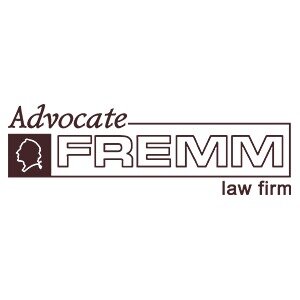
Best Creditor Lawyers in St Petersburg
Share your needs with us, get contacted by law firms.
Free. Takes 2 min.
List of the best lawyers in St Petersburg, Russia


Bespalov, Stogov and Partners

Duvernois Legal

Petersburg Legal Center LLC

Khrenov and Partners

Ivanyan and Partners
About Creditor Law in St Petersburg, Russia
Creditor law in St Petersburg, Russia is primarily governed by the federal laws of the Russian Federation, as the legal system in Russia does not differentiate significantly between regions for most types of law, including creditor rights and bankruptcy. The main statutes regulating the relationships between creditors and debtors are the Civil Code of the Russian Federation, the Federal Law on Insolvency (Bankruptcy), and related legislation. These laws establish the rights and duties of creditors, procedures for collecting debts, and the legal framework for insolvency and restructuring proceedings.
Why You May Need a Lawyer
Individuals and businesses may require legal advice or representation in creditor matters for various reasons. Common situations include needing to recover a debt, navigating the complexities of insolvency procedures, dealing with non-performing loans, interpreting the rights and responsibilities when declaring bankruptcy, or when facing a debtor's insolvency. Moreover, legal guidance is essential when drafting or reviewing financial agreements to ensure that creditors' interests are adequately protected under Russian law. A qualified lawyer can assist in these matters to ensure compliance with the legal requirements and to maximize the chances of successful debt recovery.
Local Laws Overview
In St Petersburg, as elsewhere in Russia, the key aspects that are particularly relevant to creditor include the priority of creditor claims, enforcement of security interests, the process for initiating insolvency proceedings, and the rights of secured versus unsecured creditors. The Civil Code outlines the contractual obligations and remedies in case of default, while the Federal Law on Insolvency governs the process through which a debtor's assets are liquidated or restructured to satisfy creditor claims. It's important for creditors to be aware of their legal standing, the statutory deadlines for filing claims, and the specifics of court procedures for the recovery of debts.
Frequently Asked Questions
What is the priority of claims in a Russian bankruptcy proceeding?
In bankruptcy proceedings, certain claims have priority over others. These typically include employees' wages, alimony, compensations due to harm to life or health, and certain tax claims. Secured creditor claims generally have precedence over unsecured claims.
How long do creditors have to file a claim in bankruptcy?
Creditors usually have a limited period from the date of the bankruptcy announcement in which to file their claims. The specific timeframe can be found in the Federal Law on Insolvency and is subject to change; therefore, it is advisable to act swiftly.
Can foreign creditors participate in Russian insolvency proceedings?
Yes, foreign creditors have the right to partake in Russian insolvency proceedings. They are generally granted the same rights as domestic creditors but should seek legal advice to navigate the process due to potential complexities involving cross-border legal issues.
What is the role of a creditor's meeting?
A creditor's meeting is a gathering during the bankruptcy process where creditors can discuss the insolvency, vote on the bankruptcy administrator, and make decisions on the debtor's property disposal and other crucial matters.
How are creditors categorized in insolvency proceedings?
Creditors are usually categorized based on the security of their claims—secured creditors have a right to repayment before unsecured creditors. There can also be distinctions made in terms of priority among unsecured creditors, as mandated by the law.
Is out-of-court debt recovery possible?
Yes, creditors may attempt out-of-court debt recovery through direct negotiations, payment plans, or debt collection agencies, but certain legal restrictions apply. If agreements are reached, it's essential to formalize them legally.
How can creditors enforce their rights against a debtor?
Creditors can enforce their rights through court orders, seizure, and sale of the debtor's property, and other legal mechanisms outlined in the Civil Code and related laws.
What protections do secured creditors have?
Secured creditors hold a lien or other security interest over a debtor's assets, giving them a priority claim over the assets secured if the debtor defaults or goes through bankruptcy.
Can a creditor challenge the transactions made by the debtor prior to insolvency?
Transactions made before insolvency can be challenged if they are deemed fraudulent or preferential, with the goal of protecting the debtor's estate for fair distribution among creditors.
Are personal guarantees enforceable in Russia?
Personal guarantees are enforceable, but they must comply with the formal requirements set out in the Civil Code, and there may be challenges in enforcing them, especially if the guarantor lacks sufficient assets.
Additional Resources
For those seeking legal advice in creditor matters in St Petersburg, the following resources can be helpful: the Russian Federal Tax Service for bankruptcy-related queries, the Russian Arbitrazh (Commercial) Courts for dispute resolution, and professional legal associations that can provide referrals to qualified attorneys specializing in creditor law. Additionally, consulting the official online portal of legal information (pravo.gov.ru) can provide access to the full texts of relevant laws and regulations.
Next Steps
If you require legal assistance in creditor law in St Petersburg, the first step is to consult with a qualified attorney who specializes in this field. They can provide you with tailored advice, represent you in legal proceedings, and help ensure that your rights as a creditor are fully protected. It is advisable to act quickly to avoid missing important legal deadlines and to preserve your claims. Documenting all communication and transactions with debtors can be crucial in legal cases, so maintaining meticulous records is also recommended.
The information provided on this page is intended for informational purposes only and should not be construed as legal advice. While we strive to present accurate and up-to-date information, we cannot guarantee the accuracy, completeness, or currentness of the content. Laws and regulations can change frequently, and interpretations of the law can vary. Therefore, you should consult with qualified legal professionals for specific advice tailored to your situation. We disclaim all liability for actions you take or fail to take based on any content on this page. If you find any information to be incorrect or outdated, please contact us, and we will make efforts to rectify it.


